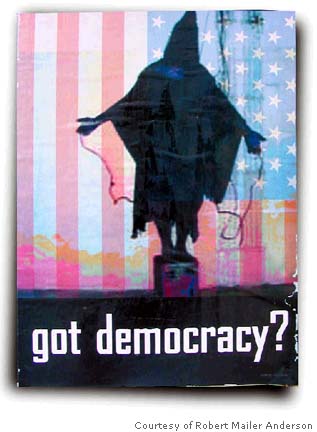Christopher Hitchens, who broke with fellow liberals in order to support the war in Iraq and has been having a very public near-nervous breakdown trying to justify that position ever since, ratchets up his rhetoric another notch in order to take on Michael Moore’s Fahrenheit 9/11: Unfairenheit 9/11 – The lies of Michael Moore.
Not having seen the movie, I’m not in a very good position to criticize Hitchens’ criticism. But what I can say is this: Hitchens is seriously losing it.
Hitchens compares Moore to Rush Limbaugh, which I suppose is fair on some level. Both men are partisans with a gift for weaving a certain kind of spell, one that combines a little information with a lot of entertainment in a way that helps true believers chuckle while their pre-existing views are reinforced.
Which wouldn’t be bad in and of itself. But along with the information comes a certain amount of disinformation. In Limbaugh’s case, I’d say that amount goes well beyond what an honest person, partisan or not, would include. In other words, I think Rush Limbaugh is completely aware that he’s misleading people, and does so intentionally and aggressively.
In Michael Moore’s case, though, I think the stray embellishments and misdirections are more innocent. Not because I happen to agree with Moore’s positions, or not only because of that, but because I think Mooore himself is more or less sincere in the conclusions he presents.
I’ve looked carefully at the arguments Moore’s critics have previously offered of Bowling for Columbine, and comparing those criticisms to the actual movie, I think the critics are making a mountain out of a molehill. I’m fairly confident that I’ll end up thinking the same thing about Hitchens’ criticisms of the latest movie, once I’ve had a chance to see it.
In the meantime, if you feel strongly one way or another about Michael Moore, you should read Hitchens’ piece and see what you think. Hitchens tries to weave a spell of his own with a combination of information, exaggeration, and embellishment, but it doesn’t have the power of the stuff Limbaugh and Moore do. There’s an air of desperation in Hitchens’ arguments, a sense that what we have here is a guy who’s hanging on by a very thin thread. While there’s a certain entertainment value in that, it’s a different kind of entertainment from what you get in a Michael Moore movie.
I’m not sure I can point to any particular point in Hitchens’ screed where he reveals his own fundamental insecurity. It’s more a sense that emerges from the piece as a whole, from the extended run-on assertions, the racing from one half-formed thought to the next, the hypercharged emotion.
Moore, Hitchens charges again and again, is not “serious”. (The word, or a variation of it, appears six times in the review.) But it is Hitchens who comes off as unhinged, incoherent, unserious. Or maybe it’s that he’s too serious, too caught up in defending his own increasingly untenable intellectual position on the war.

